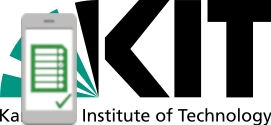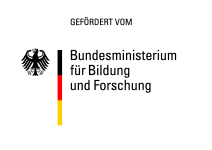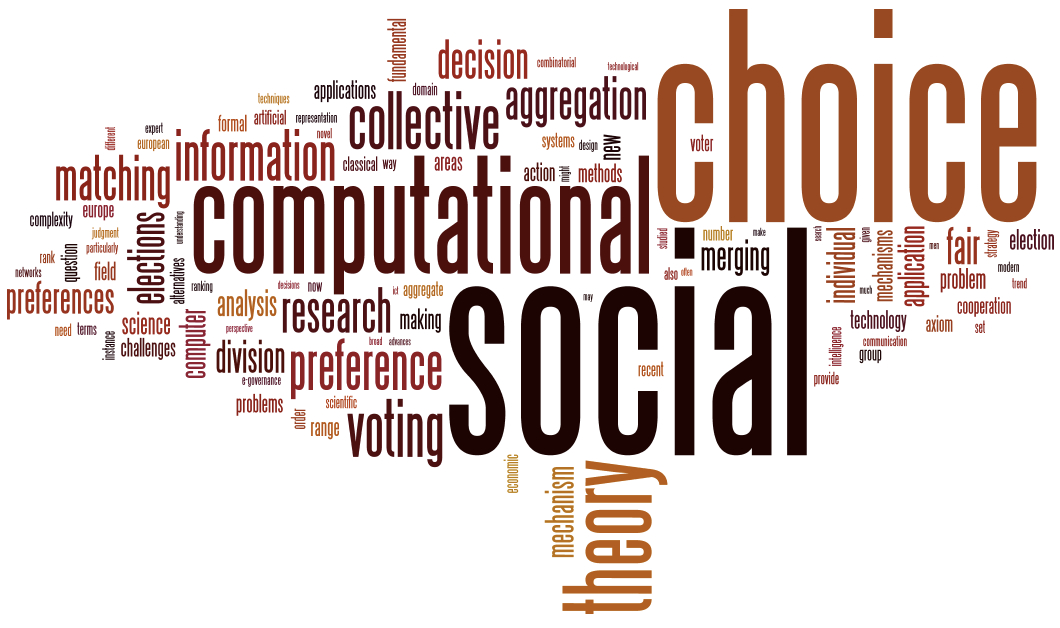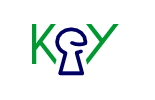|
Formal Systems II: Application
|
Lecture |
Summer Term 2025 |
- Modelling in higher-order logics and interactive theorem proving with Isabelle
|
|
Research Project
|
Team Project |
Summer Term 2025 |
- Central coordination and organisation
- Units on literature research, research questions, and progress reports
|
|
E-Voting
|
Seminar |
Summer Term 2025 |
- Attacks and Formal Verification for Postal Voting using ProVerif
|
Fairness and Non-Discrimination
from the Viewpoints of Philosophy and Informatics
|
Seminar |
Summer Term 2025 |
- Compatibility of Equalized Odds and Predictive Parity
|
|
LLMs in Formal Verification
|
Seminar |
Summer Term 2025 |
|
|
Research Project
|
Team Project |
Winter Term 2024/25 |
- Central coordination and organisation
- Units on literature research, research questions, and progress reports
- Voting Power in the Formal Argumentation about Voting Rules
|
|
Neural Networks in Formal Verification
|
Seminar |
Winter Term 2024/25 |
- LLMs for Formal Specifications
|
|
Research Project
|
Team Project |
Summer Term 2024 |
- Central coordination and organisation
- Units on literature research, research questions, and progress reports
|
|
E-Voting
|
Seminar |
Summer Term 2024 |
- Formal Verification of Verifiability and Eligibility Using ProVerif
- Secure Multi-Party Computation for Secret Calculations of Order-Based and Real Parliamentary Election Results
|
|
Research Project
|
Team Project |
Winter Term 2023/24 |
- Central coordination and organisation
- Units on literature research, research questions, and progress reports
- Formal Verification of Verifiable and Secret Online Elections with Strong Software Independence
|
|
Research Laboratory for Formal Systems
|
Laboratory |
Winter Term 2023/24 |
- Coordination and organisation
|
|
Formal Systems II: Application
|
Lecture |
Summer Term 2023 |
- Modelling in higher-order logics and interactive theorem proving with Isabelle
|
|
Research Project
|
Team Project |
Summer Term 2023 |
- Central coordination and organisation
- Units on literature research, research questions, and progress reports
- From Structural Commonalities to Component-Based Construction of Approval-Based Committee (ABC) Rules
|
Fairness and Non-Discrimination
from the Viewpoints of Ethics and Informatics
|
Seminar |
Summer Term 2023 |
- Coordination and organisation
- A Broader View of Discrimination
|
|
Research Laboratory for Formal Systems II: Application
|
Laboratory |
Summer Term 2023 |
- Coordination and organisation
|
|
Research Project
|
Team Project |
Winter Term 2022/23 |
- Central coordination and organisation
- Units on literature research, research questions, and progress reports
|
|
Software Engineering Practice
|
Laboratory |
Winter Term 2022/23 |
- Secure Online Elections Using ElectionGuard and Helios
|
|
Research Laboratory for Formal Systems
|
Laboratory |
Winter Term 2022/23 |
- Coordination and organisation
|
|
Research Project
|
Team Project |
Summer Term 2022 |
- Central coordination and organisation
- Units on literature research, research questions, and progress reports
|
|
E-Voting
|
Seminar |
Summer Term 2022 |
- Verified Construction of Correct Election Verifiers Using the Theorem Prover Coq
|
|
Research Project
|
Team Project |
Winter Term 2021/22 |
- Central coordination and organisation
- Units on literature research, research questions, and progress reports
|
|
Application of Formal Methods
|
Seminar |
Winter Term 2021/22 |
- Combining Model Checking and Deduction
|
|
Research Project
|
Team Project |
Summer Term 2021 |
- Central coordination and organisation
- Units on literature research, research questions, and progress reports
|
Fairness and Non-Discrimination
from the Viewpoints of Ethics and Informatics
|
Seminar |
Summer Term 2021 |
- Coordination and organisation
|
|
Research Laboratory for Formal Systems II: Application
|
Laboratory |
Summer Term 2021 |
- Coordination and organisation
|
|
Research Project
|
Team Project |
Winter Term 2020/21 and Summer Term 2021 |
- Central coordination and organisation
- Units on literature research, research questions, and progress reports
- Formal Security Analysis of BlockDAG Consensus
Protocols as Tournament Rankings
|
|
Research Laboratory for Formal Systems
|
Laboratory |
Winter Term 2020/21 |
- Coordination and organisation
|
|
Research Project
|
Team Project |
Summer Term 2020 |
- Central coordination and organisation
- Units on literature research, research questions, and progress reports
|
|
E-Voting
|
Seminar |
Summer Term 2020 |
- How to quantify and compare strategic manipulation for voting rules?
- Manipulations of Election Results and Risk-Limiting Audits
|
Fairness and Non-Discrimination
from the Viewpoints of Ethics and Informatics
|
Seminar |
Summer Term 2020 |
- Coordination and organisation
- Quantifying and Comparing Algorithmic Unfairness
|
|
Research Laboratory for Formal Systems II: Theory
|
Laboratory |
Summer Term 2020 |
- Coordination and organisation
|
|
Research Project
|
Team Project |
Winter Term 2019/20 |
- Central coordination and organisation
- Units on literature research, research questions, and progress reports
|
|
Research Project
|
Team Project |
Summer Term 2019 |
- Central coordination and organisation
- Units on literature research, research questions, and progress reports
|
|
Formal Methods and Machine Learning
|
Proseminar |
Summer Term 2019 |
- Automatic Recommendation of Proof Methods for New Users in Isabelle/HOL
|
Fairness and Non-Discrimination
from the Viewpoints of Ethics and Informatics
|
Seminar |
Summer Term 2019 |
- Coordination and organisation
- Techniques to Discover and Evaluate Algorithmic Discrimination
- Algorithmic Fairness and Social Equality
|
|
Research Project
|
Team Project |
Winter Term 2018/19 |
- Central coordination and organisation
- Units on literature research, research questions, and progress reports
|
|
Research Project
|
Team Project |
Summer Term 2018 and Winter Term 2018/19 |
- Central coordination and organisation
- Units on literature research, research questions, and progress reports
- A Component-Based Approach to the Property-Oriented Design of Voting Rules
|
|
Software Engineering Practice
|
Laboratory |
Summer Term 2018 |
- Blockchain-based E-Voting
|
|
Research Project
|
Team Project |
Winter Term 2017/18 |
- Central coordination and organisation
- Units on literature research, research questions, and progress reports
|
|
Software Engineering Practice
|
Laboratory |
Winter Term 2017/18 |
- Development of a Relational Debugger
|
|
Research Project
|
Team Project |
Summer Term 2017 |
- Central coordination and organisation
- Units on literature research, research questions, and progress reports
|
|
Deductive Software Verification – The KeY Book
|
Proseminar |
Summer Term 2017 |
- Verification of Counting Sort and Radix Sort
|
Deductive Software Verification –
From Theory to Practice
|
Seminar |
Summer Term 2017 |
|
Computer Science meets
Philosophy – the Future of AI
|
Seminar |
Summer Term 2017 |
- Coordination and organisation
- Cognitive Superpowers
- Capability Control for AI Control
- Axiomatisation of Criteria for Choosing Values,
Decision Procedures
|
|
Research Project
|
Team Project |
Winter Term 2016/17
|
- Central coordination and organisation
- Units on literature research, research questions, and progress reports
- Formal Verification of Fair Data Traffic
|
|
Software Engineering Practice
|
Laboratory |
Winter Term 2016/17 |
- Development of a Tool for Analysing
Formal Properties of Voting Rules
|
Disasters in Software-Security:
Can Formal Methods Help?
|
Proseminar |
Summer Term 2016 |
- Automatic Vulnerability Discovery Using
Fuzzing and Symbolic Execution
- Attacks on IT Security at Electronic Elections
|
|
Research Project
|
Team Project |
Winter Term 2015/16
and Summer Term 2016 |
-
Combining Graph-Based and Deductive Information-Flow Analysis for Proving Noninterference
|
|
Disasters in Software-Security
|
Proseminar |
Winter Term 2015/16 |
- Voting Paradoxes
- Secure Electronic Elections
|

 Google Scholar
Google Scholar







